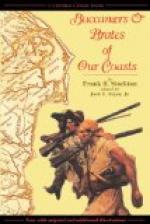The pirates left on the island were eventually taken off by a buccaneering vessel, but L’Olonnois had now reached the end of the string by which the devil had allowed him to gambol on this earth for so long a time. On the shores where he had now landed he did not find prosperous villages, treasure houses, and peaceful inhabitants, who could be robbed and tortured, but instead of these he came upon a community of Indians, who were called by the Spaniards, Bravos, or wild men. These people would never have anything to do with the whites. It was impossible to conquer them or to pacify them by kind treatment. They hated the white man and would have nothing to do with him. They had heard of L’Olonnois and his buccaneers, and when they found this notorious pirate upon their shores they were filled with a fury such as they had never felt for any others of his race.
These bloody pirates had always conquered in their desperate fights because they were so reckless and so savage, but now they had fallen among thoroughbred savages, more cruel and more brutal and pitiless than themselves. Nearly all the buccaneers were killed, and L’Olonnois was taken prisoner. His furious captors tore his living body apart, piece by piece, and threw each fragment into the fire, and when the whole of this most inhuman of inhuman men had been entirely consumed, they scattered his ashes to the winds so that not a trace should remain on earth of this monster. If, in his infancy, he had died of croup, the history of the human race would have lost some of its blackest pages.
Chapter XVI
A Pirate Potentate
Sometime in the last half of the seventeenth century on a quiet farm in a secluded part of Wales there was born a little boy baby. His father was a farmer, and his mother churned, and tended the cows and the chickens, and there was no reason to imagine that this gentle little baby, born and reared in this rural solitude, would become one of the most formidable pirates that the world ever knew. Yet such was the case.
The baby’s name was Henry Morgan, and as he grew to be a big boy a distaste for farming grew with him. So strong was his dislike that when he became a young man he ran away to the seacoast, for he had a fancy to be a sailor. There he found a ship bound for the West Indies, and in this he started out on his life’s career. He had no money to pay his passage, and he therefore followed the usual custom of those days and sold himself for a term of three years to an agent who was taking out a number of men to work on the plantations. In the places where these men were enlisted they were termed servants, but when they got to the new world they were generally called slaves and treated as such.
When young Morgan reached the Barbadoes he was resold to a planter, and during his term of service he probably worked a good deal harder and was treated much more roughly than any of the laborers on his father’s farm. But as soon as he was a free man he went to Jamaica, and there were few places in the world where a young man could be more free and more independent than in this lawless island.




